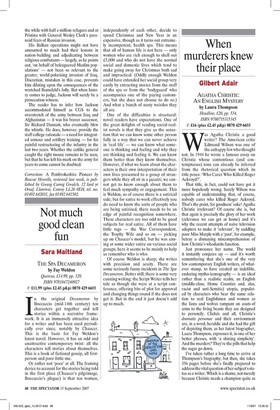Not much good clean fun
Sara Maitland THE SPA DECAMERON by Fay Weldon Quercus, £14.99, pp. 329, ISBN 9781847240927 © £11.99 (plus £2.45 p&p) 0870 429 6655 1 n the original Decameron by Boccaccio (mid-14th century) ten characters get together and tell stories within a narrative framework. It is an immensely attractive idea for a writer and has been used periodically ever since, notably by Chaucer. This is the basis for Fay Weldon's latest novel. However, it has an odd and unattractive contemporary twist: all the characters tell stories about themselves. This is a book of fictional gossip, all firstperson and poor-little-me.
Or rather not 'poor' at all. The framing device to account for the stories being told in the first place (Chaucer's pilgrimage, Boccaccio's plague) is that ten women, independently of each other, decide to spend Christmas and New Year in an expensive, though as it turns out extremely incompetent, health spa. This means that all of human life is not here — only women who are rich enough to shell out £5,000 and who do not have the normal social and domestic lives which tend to make going away for Christmas both sad and impractical. (Oddly enough Weldon could have extended her social group very easily by extracting stories from the staff of the spa or from the 'bodyguard' who accompanies one of the paying customers, but she does not choose to do so.) And what a bunch of nasty weirdos they all are.
One of the difficulties is structural: novel readers have expectations. One of the great delights of reading social-realist novels is that they give us the sensation that we can know some other person fully in a way that we can never achieve in 'real life' — we can know what someone is thinking and feeling and why they are thinking and feeling it. We can know them better than they know themselves. However, if what we learn about the characters is their own interpretation of their own lives presented to a group of strangers while they all sit in a jacuzzi, we cannot get to know enough about them to feel much sympathy or engagement. This is Weldon, so of course there is a satirical side; but for satire to work effectively you do need to know the sorts of people who are being satirised, there needs to be an edge of painful recognition somewhere. These characters are too odd to be good subjects for real satire. All of them have little tags — the War Correspondent, the Trophy Wife and so on — picking up on Chaucer's model, but he was aiming at some wider satire on various social groups; here it seems to be mainly to help us remember who is who.
Of course Weldon is sharp; she writes with precision and acuity. There are some seriously funny incidents in The Spa Decameron. Better still, there is some very cunning writing: the Script Writer tells her tale as though she were at a script conference, offering bits of plot for approval and changing things round if she does not get it. But in the end it just doesn't add up to much.

























































 Previous page
Previous page